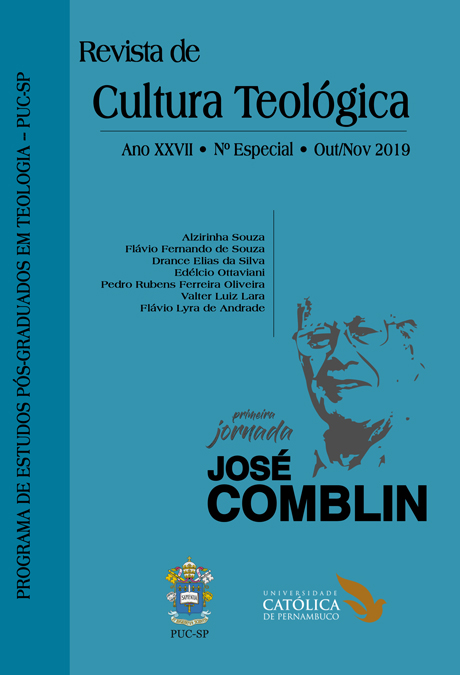Cidadania Romana na Epístola aos Filipenses: um diálogo com José Comblin
DOI:
https://doi.org/10.23925/rct.i0.45260Palavras-chave:
Paulo, Filipenses, Comblin, Bíblia, Cidadania RomanaResumo
O presente artigo visa a refletir a interpretação que José Comblin oferece sobre a situação que motivou Paulo de Tarso ao escrever a Epístola aos Filipenses. Trata-se não apenas da retomada do trabalho do mestre Comblin publicado em 1985 como comentário à Epístola, mas de um diálogo que abre novas possibilidade de compreensão do contexto não só de Paulo, mas da própria comunidade a quem ele escreve. O objetivo é demonstrar como o autor entende a prisão de Paulo e o que pode acontecer com ele naquele contexto imediato. Além da possibilidade dessa motivação primeira, cujo centro é a possibilidade do uso da cidadania romana que Paulo, naquele momento, pressupostamente poderia apresentar para “escapar” do martírio, procuramos acrescentar outros elementos do contexto sociológico dos destinatários da carta: a nova vida em Cristo dos filipenses precisa enfrentar as tensões de uma cidade orgulhosa por ostentar o status de colônia romana. A situação imediata de Paulo prisioneiro é, sem dúvida, motivação importante de um dos três bilhetes que compõem o conjunto da Epístola. Entretanto, a realidade de conflito social, vivida pela comunidade ao enfrentar o modelo sociocultural de desigualdade dominante, explica o caráter da exortação ética em torno da unidade (Fl 2,1-5) e o modelo cristológico apresentado como critério para viver o exemplo de Jesus que se fez escravo (Fl 2,6-11). Ambos, seguimento de Jesus e o novo modelo de relacionamento humano, são as marcas da identidade cristã que deve prevalecer como testemunho frente aos de fora.Downloads
Publicado
2019-11-19
Como Citar
Lara, V. L. (2019). Cidadania Romana na Epístola aos Filipenses: um diálogo com José Comblin. Revista De Cultura Teológica, 126–142. https://doi.org/10.23925/rct.i0.45260
Edição
Seção
Artigos Relacionados


